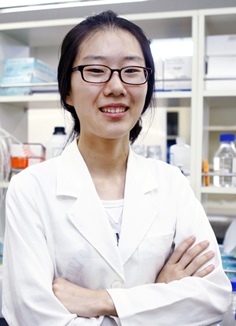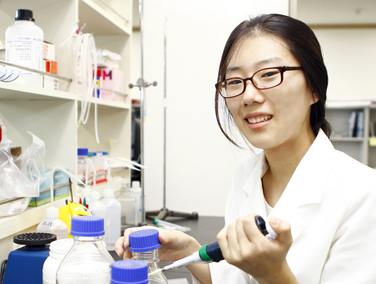First to clarify mechanisms that the deficiency of vitamin B12 triggers neuropsychiatric diseases such as dementia
In past three years, 13 SCI theses published by undergraduate students, becoming established as a tradition of School of Biotechnology
[September 5, 2011]
“With the society becoming older, there is a growing interest and hopes for a healthy life in retirement. There is also a growing fear of neuropsychiatric ailments such as Alzheimer’s. This is because it takes much longer to overcome this compared to other age-related diseases or cancer. I hope that our research will become a small cornerstone for the challenge to overcome dementia for all humanity.”

Jeong, Jin-ju (22, photo), a senior at the Yeungnam University School of Biotechnology published her theses on two SCI journals in just five months. She is the principal author despite the fact that she is an undergraduate student.
Her topic of research since her junior year was the correlation between vitamin B12 (cobalamin) and dementia. It is a well known fact that the deficiency of vitamin B12 can trigger neuropsychiatric diseases such as Alzheimer’s. However, its cause and mechanism were not yet clearly defined.
After staying up many nights for a year under the guidance of Professor Kim, Ji-hoe, she revealed that GSH (glutathione), which is known to be a very strong antioxidant and a type of amino acid generated by the liver, adjusted the functions of protein (bCblC), which is involved with the metabolism of vitamin B12. bCblC combines with vitamin B12 and is involved with the activated B12 synthesis, and GSH increases this bonding strength.
The preliminary result of her paper on the correlation of vitamin B12 and neuropsychiatric diseases such as dementia was published in March on 《Biochemistry & Molecular Biology reports》, and then further research results were carried later in August by 《Biochemical and Biophysical Research Communication》, which is published by Elsvier, the world’s largest publisher in the science, technology and medical sector. Thus its academic value was recognized internationally.
Professor Kim, Ji-hoe (39), the corresponding author of this paper, said, “I worked with Jin-ju for about a year and a half. She is a very diligent student that stays at the lab until midnight experimenting and researching almost every day during the semester, and even during vacations.” Professor Kim also added, “Because of Jin-ju, our lab has become famous to be the last room in which the lights are turned off in our department.”
Thus, Jung has become the fourth student to carry on the tradition of School of Biotechnology of ‘undergraduate students publishing SCI theses as the principal author’. The first was Park, Gi-hoon (26) who published a thesis that revealed the ‘Possibilities of Using Arteriosclerosis Treatment Medicine using Proteins Extracted from Hyphantriacunea’, who was a senior at the time in November 2008. Currently, he is enrolled at the Graduate School of Biotechnology working on both his master’s and PhD. The second was Jang, Wook-joo (22), who published the thesis on the diabetes and aging mechanism by fructose in January 2010 on an SCI journal. He was a junior at the time and is now working on his master’s degree at the Graduate School of Biotechnology. In June of the same year, Park, Jeong-heun (23) published a clinical research paper that found an important trace that could prevent arteriosclerosis in an SCI journal as a senior. He is also now working on his master’s degree at the Graduate School of Biotechnology.

Jung was also selected to work on a bachelor and master’s accelerated degree program. From next semester, he will be continuing his research in a master’s degree program. He said, “I am happy to be able to carry on the proud tradition of our school. I was able to learn a lot from the great examples set by my seniors, and I was able to make good achievements because they paved the way.” He also revealed his ambitions saying, “I want to become a biotechnology that conducts research needed by humanity and society.”
Khang, Yong-ho (55), the dean of School of Biotechnology, said, “With the principal authors of SCI theses being undergraduate students coming out from Professor Cho, Kyung-hyun’s lap three years ago, there has been a healthy competition among the professors and students in the school. Our school also strengthens conditions for promoting professors and creates an ideal professor that leads research. The school is also striving to cultivate a department custom by making it mandatory to operate a ‘journal club’ for reviewing the latest theses and making oral presentations on bio-related fields. In result, in the past three years, it had astonishing results in which a total of 13 theses by undergraduate students, including five with the principal author being undergraduate students, being published in SCI journals.” He added, “I hope that this can spread to the entire university so that more extraordinary papers are written by students of Yeungnam University.”











